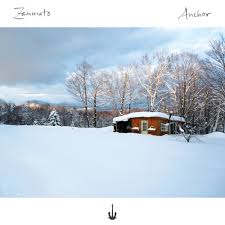"The one thing I was really proud of with The Books is that our audience was filled with individuals. […] People would respond to different moments in the show in very different ways, and I remember looking out into the audience to see little pockets of laughter or a single person in tears, like little sparks going off."
Anyone who’s listened to Nick Zammuto’s former band likely knows exactly what he’s getting at here. There was a very open-ended quality to nearly all of their work; you didn’t know if what you were hearing was supposed to be dramatic, humorous, or emotional, and it felt like all of those elements were in there somewhere if you were looking for them. There was enough space in the music to allow the listener to draw their own conclusions, but they took great care in ensuring that every element worked together and meant something. This may be why they always felt like such a singular band; they had a very clear vision of what the group was to be, and they had certain habits (such as rummaging thrift stores for old answering machine tapes, hoping to find some magic) that ensured that they wouldn’t sound like anyone else.
While The Books are no more, Zammuto’s new band carries a lot of that aesthetic forward – they’re more song-based than collage-driven, but that uniqueness is still there. Then again, Nick Zammuto isn’t exactly a typical musician; he lives in a self-built home in a farmland in Vermont, and financed the record partly by selling gadgets such as a ‘bass projector’ (which forms an image of sound waves onto the ceiling), or the ‘Spoonbox’, a sculpture of dancing spoons controlled by an MP3 player. The video for ‘IO’ details the building of a gigantic wooden catapult and the subsequent flinging of old studio equipment all over the forest. That sense of invention applies to his music as well; most of his compositions seem to have an explicit goal of showing the listener something new, or at least to find new ways of doing something fun.
From a surface level, there’s a lot to like about Anchor. The songs are catchy and the sound design is often brilliant, and to be honest you don’t really need much more than that. But very little of this is straightforward; there isn’t a whole lot of 4/4 on here, many of the chords are dissonant, and several of the tunes hang on odd concepts. There’s a song based off a percussive loop made from a scratched vinyl (‘Great Equator’), a song where every instrument seems to have been produced for a different album (‘Sinker’, though a lot of the music here feels that way), and a song with such a convoluted time signature that it’s nearly impossible to track (amusingly titled ‘Stop Counting’). Much of this is done to give a real element of surprise to an album that’s otherwise fairly accessible; the album messes with expectations enough to create an atmosphere where it feels like anything can happen.
Nick described the band’s 2012 self-titled release as a "do or die" album, as in if it hadn’t been successful, he probably would have retired from music altogether. Luckily it wound up working out – it was successful enough to continue the project (as a result, the IndieGoGo campaign to finance this album wound up hitting 350% of its original goal) and it was good enough to make the band seem like more than just a Books spin-off project. But even then, it wasn’t exactly clear what the band Zammuto was – there was a lot of very conceptual stuff and a few tracks that were clearly one-offs, and like most of his work the album felt very much like a studio creation. It feels a little odd to talk of the funkiness and looseness of an album as subtle and tightly controlled as Anchor, but there’s definitely a conscious effort to throw in some improvisation and let the band lead the way. In particular, drummer Sean Dixon gets totally unleashed on a few tracks, and Nick’s brother and bass player Mikey plays with more fluidity and rigour than on the first LP. The vocals also feel like an improvement; there’s more confidence and a greater range here, rather than a heavy reliance on auto-tune (also, bringing in Daniela Gesundheit of Snowblink for a few songs was a good move).
Still, fans of Nick’s previous work should feel right at home; it’s livelier and more overtly catchy than anything in his catalogue, but at its core, much of Anchor is a refinement of the things he’s done well in the past. Though there’s a thread running through all of this, no two songs sound alike; ‘Need Some Sun’ is a straight-up bass-driven jam in 5/4, ‘IO’ is jerky, almost Devo-like New Wave, ‘Henry Lee’ works off shimmering walls of synth noise, and ‘Don’t Be a Tool’ has the sort of deep pinging percussive sounds that you would associate with Autechre.
Clearly, the man spends a lot of time tooling around in the studio, finding sounds he likes and throwing them through all sorts of different filters and machines until it produces something totally unique; in this way Zammuto shares a sort of kinship with early psychedelic groups like Pink Floyd and Faust. This is a difficult trick to full off in a pop context, but he manages to get it all in a relatively short running time (the album doesn’t even top the 40-minute mark unless you count the bonus track ‘Codebreaker’), which makes Anchor the type of album that will likely sound just as great well on down the road as it does on first listen.
<div class="fb-comments" data-href="http://thequietus.com/articles/16152-zammuto-anchor-review” data-width="550">


